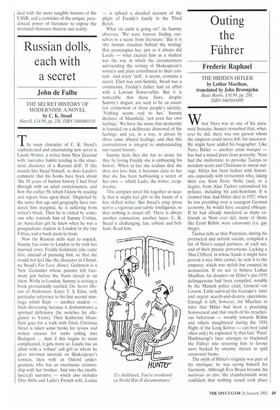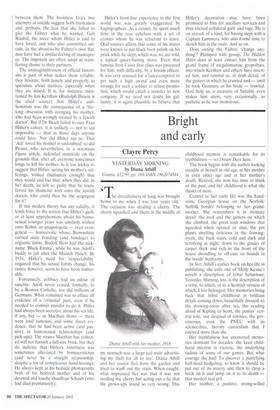Outing the Fiihrer
Frederic Raphael
THE HIDDEN HITLER by Lothar Macthan, translated by John Brownjohn Basic Books, f10.99, pp. 288, ISBN 0465043089 When Nero was in one of his paranoid frenzies, Seneca remarked that, whatever he did, there was one person whom the emperor could never kill: his successor. He might have added his biographer. Like Nero, Hitler — another artist manqué — has had a mixed press from posterity. Nero had the misfortune to provoke Tacitus to mordant scorn and Christians to moral outrage. Hitler has been luckier with historians, especially with revisionists who, taking their cue from Ernst Nolte (and, to a degree, from Alan Taylor) rationalised his policies, including his anti-Semitism. It is claimed that, had Hitler died in 1937, when he was presiding over a resurgent German economy, he would have escaped obloquy. If he had already murdered as many exfriends as Nero ever did, many of them. like Ernst Rohm, were unsavoury (i.e. gay thugs).
Tacitus tells us that Pe tronius, during his protracted and skittish suicide, compiled a list of Nero's sexual partners, of each sex, anti of their precise perversions. Lacking a Max Clifford, in whose hands it might have proved a nice little earner, he sent it to the emperor, which was stylish but ensured its destruction. If we are to believe Lothar Macthan, fat dossiers on Hitler's pre-1933 delinquencies had been compiled, notably by the Munich police chief, General von Lossow. Little survived the Gestapo's later and urgent search-and-destroy operations. Enough is left, however, for Macthan to infer that Hitler had been a practising homosexual and that much of his treacherous behaviour — notably towards Rohm and others slaughtered during the 1934 Night of the Long Knives — can best (and often only) be explained by that fact. `Putzi' Hanfstaengl's later attempts to blackmail the Rihrer into restoring him to favour were backed by smarmy threats to spill unsavoury beans.
The myth of Hitler's virginity was part of his mystique: he was saving himself for Germany. Although Eva Braun became his mattresse en titre, the chambermaids were confident that nothing sexual took place between them. The brainless Eva's two attempts at suicide suggest both frustration and, perhaps, the fear that she failed to give the Fiihrer what he wanted. Geli Raubal, the niece whom Hitler is said to have loved, and who also committed suicide, in the about-to-be Fuhrer's own flat, may have had a similar feeling of inadequacy. The impotent are often adept at transferring shame to their partners.
The unimaginativeness of official historians is part of what makes them reliable: they hesitate, both lamely and properly, to speculate about motives, especially when they are mixed. It is, for instance, mentioned by Ian Kershaw (Rudolph Binion is the cited source) that Hitler's antiSemitism was the consequence of a 'lifelong obsession with avenging his mother, who had been wrongly treated by a Jewish doctor'. But if Dr Bloch failed to cure Frau Hitler's cancer, it is unlikely — not to say impossible — that in those days anyone could have. Nor did Hitler say so. That 'Adi' loved his mother is undoubted; so did Proust, who nevertheless, in a notorious Figaro article, defended matricide on the grounds that, after all, everyone sometimes longs to kill his mother. Is it too tricksy to suggest that Hitler, seeing his mother's sufferings, wished (humanely enough) that they would end but that, when they did, in her death, he felt so guilty that he transferred his shameful wish onto the Jewish doctor, who could then be the scapegoat for it?
If this modest theory has any validity, it lends force to the notion that Hitler's guilt, or at least apprehension, about his homosexual younger years was similarly wished onto Rohm, an unapologetic — even evangelical — homoerotic whose Brownshirts carried male bonding (and bondage) to orgiastic limits. Rudolf Hess had the nickname 'Black Emma', while he was AdoIfs buddy in jail after the Munich Putsch. By 1934, Hitler's need for 'respectability' required that his sexual habits change; his tastes, however, seem to have been inalterable.
Fortunately, celibacy had an odour of sanctity: Adolf never ceased, formally, to be a Roman Catholic, nor did millions of Germans. What remained was to efface all evidence of a 'criminal. past, even if he needed to commit murder to do it. Hitler had always been secretive about his sex life, if any, but — as Macthan shows — there were loud rumours, and some direct evidence, that he had been active (and passive) in homosexual relationships (and pick-ups). The straws Macthan has collected will not furnish a full-size brick, but they do indicate that Hitler's loneliness was sometimes alleviated by homoeroticism (and never by a straight relationship, despite a lot of conspicuous hand-kissing). He always kept at his bedside photographs both of his beloved mother and of his devoted and louche chauffeur Schaub (who had died prematurely).
Hitler's front-line experience in the first world war was greatly exaggerated by hagiographers. As a runner, he spent much time in the rear echelons with a set of cronies whom he was reluctant to leave. Oral sources affirm that some of his mates were known to put black boot polish on his prick while he slept, which was, we are told, a typical queer-baiting move. Even that famous Iron Cross first class was procured for him, with difficulty, by a Jewish officer. It was very unusual for a lance-corporal to get such a high award and even more strange for such a soldier to refuse promotion, which would entail a transfer to new company. If we need not doubt his gallantry, it is again plausible to believe that Hitler's decoration may have been promised to him for ancillary services and thus excited collateral guilt and rage. He is on record, of a kind, for having slept with a Captain Lammers, who also found time to sketch him in the nude. And so on.
Does outing the Fiihrer 'change anything'? Plumped with gossip. The Hidden Hitler does at least extract him from the grand frame of megalomaniac geopolitics, into which Kershaw and others have inserted him, and remind us, in drab detail, of the gutters in which he crawled and — until he took Germany as his bride — trawled. God help us, a measure of banality even makes him seem, very occasionally, as pathetic as he was monstrous.



















































































 Previous page
Previous page